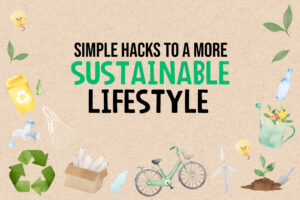Living a more sustainable and eco-friendly life doesn’t have to be expensive. In fact, making eco-conscious decisions can often save you money while reducing your environmental footprint. Whether it’s cutting down on waste, using less energy, or adopting greener habits, small changes can lead to big impacts. In this blog, we’ll share practical and affordable sustainable life hacks to help you live a greener life—without stretching your budget.
1. Reduce Single-Use Plastics
One of the simplest ways to live sustainably is by reducing your use of single-use plastics. Not only does it cut down on waste, but it also saves you money over time.
- Reusable Bags: Instead of buying plastic bags at the grocery store, invest in a few sturdy reusable bags. They’re affordable, and many stores offer discounts when you bring your own.
- Reusable Water Bottles: Buying bottled water can add up fast. Invest in a reusable water bottle and fill it up at home or public water stations. You’ll save money and reduce plastic waste.
- Reusable Food Containers: Ditch single-use sandwich bags and opt for reusable containers for packing lunches or storing leftovers. Silicone bags and glass containers are durable and eco-friendly.
2. Energy-Efficient Habits
Energy efficiency is one of the easiest ways to save money and help the environment. Here are some simple tips that won’t cost much:
- Unplug Devices: Many electronics continue to use power even when turned off. Unplugging devices when they’re not in use can save you money on your energy bill and reduce your carbon footprint.
- Use LED Bulbs: Switching to energy-efficient LED bulbs can significantly reduce your energy consumption. They may cost a bit more upfront but last much longer and use far less energy than traditional bulbs.
- Adjust Your Thermostat: Reducing your heating or cooling by just a few degrees can make a noticeable difference in your energy bills. In the winter, try using blankets and warmer clothing instead of cranking up the heat.
3. Thrift, Borrow, and Swap
New products come with a high environmental cost, from manufacturing to transportation. By reusing, borrowing, or swapping items, you can reduce waste and save money.
- Thrift Shopping: Buy second-hand clothes, furniture, and household items from thrift stores, online marketplaces, or yard sales. This keeps items out of landfills and is much more budget-friendly than buying new.
- Borrow or Rent: Instead of buying things you’ll only use a few times—like tools, camping gear, or party supplies—look into borrowing or renting them. Many communities have tool libraries, and online platforms like Fat Llama let you rent items from locals.
- Host a Swap Party: Gather friends or neighbors for a clothing, book, or household item swap. It’s a fun way to get “new-to-you” items without spending a dime.
4. DIY Natural Cleaning Products
Many conventional cleaning products contain harsh chemicals that are harmful to the environment and your health. Making your own natural cleaners is not only eco-friendly but also easy and inexpensive.
- Vinegar and Baking Soda: These household staples are powerful natural cleaners. Use vinegar for disinfecting surfaces and baking soda for scrubbing grime. Combined, they’re excellent for unclogging drains or cleaning tough stains.
- Essential Oils: Adding a few drops of essential oils like tea tree or lavender to your homemade cleaners gives them an extra boost of antibacterial power and a fresh scent.
- DIY Laundry Detergent: Making your own laundry detergent is a cost-effective way to reduce plastic waste and eliminate harmful chemicals. You only need a few ingredients like soap flakes, washing soda, and baking soda.
5. Eat More Plant-Based Meals
Incorporating more plant-based meals into your diet is one of the most impactful ways to reduce your carbon footprint. Meat production requires significant resources, including land, water, and energy.
- Meatless Mondays: Start by dedicating one day a week to eating plant-based meals. Beans, lentils, and vegetables are not only affordable but also packed with nutrients.
- Buy in Bulk: Purchasing grains, legumes, and nuts in bulk is a great way to save money and reduce packaging waste. Bring your own reusable containers to bulk stores if possible.
- Grow Your Own Herbs and Veggies: If you have space, growing your own herbs and vegetables can save you money and reduce the environmental impact of food transportation. Even a small windowsill garden can produce fresh, homegrown ingredients.
6. Conserve Water
Water conservation is critical for sustainability. These small changes can make a big difference in both your water usage and your utility bills.
- Fix Leaks: A dripping faucet or leaking toilet can waste hundreds of gallons of water over time. Fixing these small issues can save you money and help conserve water.
- Use a Water-Saving Showerhead: Installing a low-flow showerhead reduces the amount of water used without sacrificing water pressure. This is an inexpensive and effective way to cut down on water usage.
- Shorten Your Showers: Simply reducing your shower time by a few minutes can save gallons of water every day. Set a timer to keep track of time if needed.
7. Compost Your Food Scraps
Food waste is a major environmental issue, but composting your food scraps can help reduce landfill waste and create nutrient-rich soil for your garden.
- DIY Compost Bin: You don’t need fancy equipment to start composting. A simple DIY compost bin made from a plastic storage container or old wooden pallets works just fine.
- Compostable Materials: Add vegetable scraps, coffee grounds, eggshells, and yard waste to your compost bin. Avoid meat, dairy, and oily foods, which can attract pests.
- Use Compost in Your Garden: Once your compost is ready, use it to fertilize your garden, potted plants, or lawn. It’s a natural, eco-friendly alternative to chemical fertilizers.

Final Thoughts
Living sustainably doesn’t have to mean spending more money. With these sustainable life hacks, you can reduce your environmental impact while saving money and making smarter, greener choices. Whether it’s cutting down on single-use plastics, reducing energy consumption, or composting food scraps, small changes can make a big difference over time. Start with a few easy hacks, and you’ll find that living an eco-friendly lifestyle on a budget is not only possible but also rewarding.

